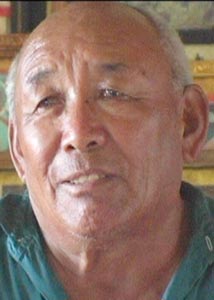Name: Norbu
(Alias: No)
Gender: Male
Interview Age: 70
Date of Birth: 1937
Birthplace: Sang, Utsang, Tibet
Year Left Tibet: 1960
Profession: Farming
Monk/Nun: No
Political Prisoner: No

Interview No.: 10
Date: 2007-07-02
Language: Tibetan
Location: Lugsung Samdupling Settlement, Bylakuppe, Karnataka, India
Categories: Chinese Invasion and Occupation
Keywords: brutality/torture, business practices/livelihood, childhood memories, Chinese -- first appearance of, Chinese -- oppression under, Chinese rule -- life under, Chushi Gangdrug guerrillas, environment/wildlife, escape experiences, farm life, forced labor, poor/lower class, refugee in India -- life as, thamzing/struggle sessions, Utsang
Summary:
Norbu had a very adventurous childhood in Tibet, hunting and fishing for both fun and for his livelihood, as his family was poor. At age 17, he killed a bear with his knife in self defense. A prize kill would be a musk deer, which sold for a good price. Norbu gives a fascinating and suspenseful account of the villagers' hunting expeditions.
Norbu narrates how he and other Tibetans worked at Chinese road construction sites, how the Chinese appeared to be friendly at the beginning in order to gain their confidence, and how they gradually tightened their control.
Norbu recounts the horrifying events of when Sangay Dorji, one of the richest people of the village, was subjected to thamzing 'struggle sessions.' Norbu describes a confrontation with a Chinese officer, who called Norbu, "a wolf in sheep's clothing." Fearing that he and his family would be subjected to thamzing, his large family embarked on a month long escape to India.
Interview Team:
- Rebecca Novick (Interviewer)
- Ronny Novick (Videographer)
- Tsering Dorjee (Interpreter)

